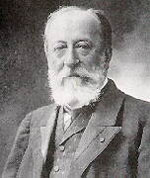
Welcome to Hyperion Records, an independent British classical label devoted to presenting high-quality recordings of music of all styles and from all periods from the twelfth century to the twenty-first.
Hyperion offers both CDs, and downloads in a number of formats. The site is also available in several languages.
Please use the dropdown buttons to set your preferred options, or use the checkbox to accept the defaults.

Saint-Saëns was a child prodigy and gave his first concert as a pianist in 1846 at the Salle Pleyel. On this occasion he performed concertos by Mozart and Beethoven, a Bach Prelude and Fugue and works by Handel and Kalkbrenner. Not only did he perform without reference to scores but for an encore he invited the audience to choose any one of the thirty-two Beethoven piano sonatas which he had also committed to memory! It is easy to see how such a precocious talent came to be compared from an early age with that of Mozart whose music he adored, along with Bach, Haydn, Schubert and Mendelssohn. This list is revealingly conservative and Reynaldo Hahn and Alfred Bruneau were not alone in describing him as ‘musical art’s last great classicist’. Saint-Saëns himself later recollected how ‘everything in my youth seemed calculated to keep me far removed from romanticism’. However, despite his continued promotion of German composers such as these throughout the nineteenth century he was fiercely patriotic and spent a great deal of time and effort in the cause of French art. To this end he became a founding member of the Société Nationale in February 1871 which, under its motto ars gallica, set about the promotion of French music and the establishment of a national style in those difficult years that followed the Franco-Prussian war. Indeed Saint-Saëns the conservative was paradoxically also a great innovator. He was one of the first significant composers to write solo music for the harmonium, and was amongst the first French composers of the nineteenth century to write chamber music. Credited with almost single-handedly developing the solo concerto in France, he was also one of the first to incorporate genuine Arabic melodies into his scores (such as those in Samson et Dalila, or the Suite algérienne, Op 60). In 1908 he became the first notable composer to write a film score with L’assassinet du duc de Guise, Op 128, and whilst his appreciation of early music can be considered unusual in France, his remarks pertaining to performance practice were undeniably way ahead of their time.
Saint-Saëns was also a remarkable, largely self-taught polymath and the list of his interests and achievements is as wide ranging as his career. It varies from astronomy, geology, archaeology, history, sculpture, painting and mathematics to anthropology, zoology, animal welfare and travel.
Even if occasionally he had to wait longer than he would have liked, his efforts in all spheres did not go unrewarded. He was made a member of the German Association of Musicians, a Grand Officer of the Légion d’honneur and a member of the Académie des Beaux-Arts. He was also awarded the German Order of Merit, an honorary doctorate from Cambridge University, was made a Commander of the Victorian Order, and even had a museum devoted to him in Dieppe.
Given such undeniable success it seems all the more remarkable that Saint-Saëns became so marginalized both by his peers and by history. Certainly his aesthetics were often not those of his age but this alone is not sufficient to explain the wilful neglect he has received. The reasons for this may well have more to do with personality than with music. It is true that he experienced at times a ‘sea of injustice’ in his struggles to stage his dramatic works and the scandalous duplicity surrounding the cantata competition of 1867 in particular. The mistrust of institutions this engendered might have been a very healthy one though had he not remained so desperate for their approval. He suffered almost constant ill health and the deaths of close friends, his children and his mother left him in a depression causing insomnia, an inability to work and, at times, contemplating suicide. Today he would doubtless have been medicated. As it was he didn’t always behave in his own best interests, and his career and reputation would doubtless have been better served had he left many opinions unvoiced. Had he not criticized the formation of orchestral unions, for instance, the players may not have refused to play his music! Unfortunately history has chosen those occasions on which he was rude, opinionated or abrupt by which to remember him, overlooking those not infrequent instances of great benevolence. There are numerous examples of his not only encouraging the performance of younger composers’ works but also of his using influence to secure appointments or introductions for them. Henri Malherbe claimed to know personally at least two organists whose rent was paid by Saint-Saëns after they lost their jobs following the 1903 moto proprio of Pius X. This is clearly not the man that Martin Cooper described as ‘full of years and malice’.
from notes by Andrew-John Smith ©




